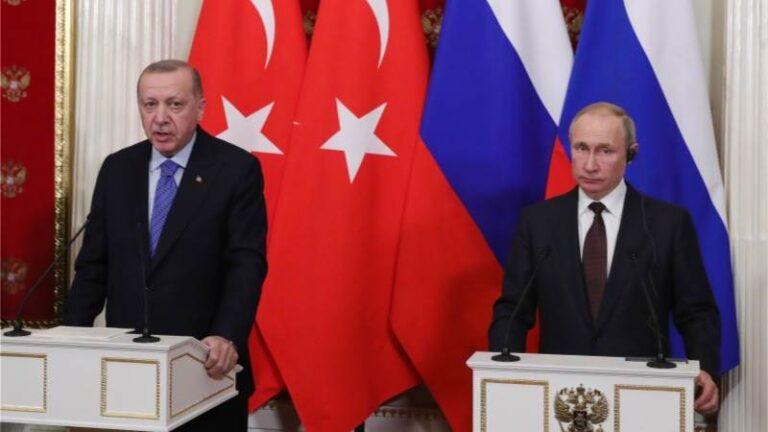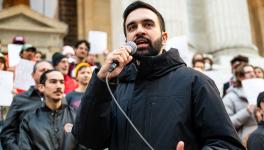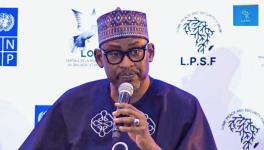Nagorno-Karabakh Needs Regional Solution

Turkish President Recep Erdogan (L) with Russian President Vladimir Putin (R) File photo
The demonisation of Turkey and President Recep Erdogan has been carried too far in the most recent years in the western media. Turkey appears to be mired in controversies all across its neighbourhood — maritime boundary disputes with Greece and Cyprus; occupation of northern Syria; intervention in Libya; support of the Muslim Brotherhood and Hamas; sponsorship of radical Islamist groups, etc.
This is being perceived as stemming from Erdogan’s Neo-Ottoman ambitions to reclaim Turkey’s legacy as an imperial power. However, on closer look, the common thread here is Turkey’s rise as a regional power in the post-cold war era. As multipolarity gains traction in international diplomacy, more and more countries will start behaving like Turkey — exploring new opportunities to pursue independent foreign policies.
Branding this outlook as ‘neo-Ottoman’ is obfuscating the geopolitical reality that as Erdogan assertively navigates a way forward to create space for Turkey in a tough neighbourhood, it is bound to cause discomfort to other regional powers with similar regional aspirations. Thus, Israel, Greece, the UAE and Saudi Arabia have joined hands to oppose Turkey and this alliance enjoys US backing.
A certain distance has also developed between Russian president Vladimir Putin and Erdogan lately. The two countries’ differences over Syria and Libya have been apparent fro sometime, but that never stopped Putin and Erdogan from working on their convergences. Therefore, it is surprising that the conflict in Nagorno-Karabakh has generated such a public rift between Russia and Turkey.
Foreign Minister Sergey Lavrov highlights that Moscow regards Turkey only as a ‘close partner’ and not a ‘strategic partner’! Russia’s intelligence chief Sergei Naryshkin repeats the unsubstantiated allegation that Turkey is transferring jihadi groups to the Caucasus! Conceivably, Russian officials are playing to the western gallery, capitalising on the strained relations between Turkey and the US.
Putin never once contacted Erdogan directly over N-K, while he held intensive discussions with several world leaders including Trump, Macron and Rouhani — and the leaders of Azerbaijan and Armenia (more than once.)
Meanwhile, the western media created a narrative of Turkish ‘betrayal’ and propagated a conspiracy theory that Erdogan is working toward ejecting Russia from Transcaucasia. Of course, Turkey has been selling arms to Azerbaijan — but so do Russia and Israel. (Russia also equips the Armenian armed forces!)
Erdogan made sustained efforts in the past several years to forge a strategic partnership between Ankara and Baku on the basis of the two countries’ Turkic identity. But it is an entirely different thing to say Erdogan has been plotting against Russia or that he is injecting the jihadi virus into Caucasus.
The French President Emmanuel Macron started the spin that Turkey was transferring Islamist fighters from Syria to the Caucasus, but he has an old score to settle with Erdogan. It is an absurd allegation. Azeri President Aliyev abhors ‘jihadis’.
At any rate, Erdogan decided to break the ice, finally, by calling Putin on October 14. The Kremlin readout gave a positive spin, the only discordant note being Putin’s ‘serious concern over the involvement of Middle Eastern fighters in the military action.’ (The Turkish readout ignored Putin’s imputation.)
Aliyev also has clarified separately that Turkey plans to establish a military base in his country. He said, “Turkey and we have got a wide legal framework. We have agreements signed in many spheres, which include points on cooperation and mutual aid in the military sphere. This is our right. Turkey is our ally, and if there is a serious danger to Azerbaijan, we can use these opportunities. But there has been no discussion of the construction of a Turkish military base in Azerbaijan.” The remark was made possibly to allay any misconceptions in this regard in Moscow.)
Indeed, Nagorno-Karabakh crisis exposes certain contradictions in Russian policies. On the one hand, Russia befriends Turkey but on the other hand it resents Turkey’s aspirations to be a regional power.
Russia claims to have legitimate interests in Syria, but resents Turkey’s growing influence over oil-rich Azerbaijan, which is also a Caspian littoral state whom Moscow wants to keep in its orbit!
Russia stands to gain out of Turkey’s rift with NATO and EU but will not offer an equal relationship to Turkey. Russia propagates multipolarity but regards its ‘near abroad’ as its sphere of influence. Such opportunism is unsustainable.
An enduring solution to the N-K problem can only be on the basis of the people of Armenia and Azerbaijan being persuaded that in the interests of peace, the occupied region should be returned to Baku — Turkey is absolutely right on that score — with some sort of special status, perhaps, that helps reconciliation between the two nationalities.
Of course, that will also entail Russia vacating its base in Armenia, which may cause some heart burn to Moscow. Evidently, the Minsk Group is a recipe for stalemate — just as the Middle East Quartet has been — but that seems to be Russia’s choice today. All three co-chairs of the Minsk Group have lost credibility.
The Minsk Group was constituted in the early 1990 during Boris Yeltsin’s romance with the US. The international situation has radically changed during the past 3 decades. Today, as things stand in big-power relations, the Minsk Group virtually guarantees that the N-K crisis steadily morphs into a geopolitical slugfest. Haven’t we had enough of such slugfests already?
The only viable route appears to be the ‘Astana format’ within which Russia, Turkey and Iran could harmonise on Syria and move in a concerted fashion. Tehran has proposed a similar format for resolving the N-K problem, consistent with its stance that such problems are best addressed by the regional states.
But Putin seems to prefer the company of Trump and Macron, knowing fully well the US and French antipathy toward Erdogan. Perhaps, Putin is doing what he can to help Trump’s re-election? (The Armenian lobby is influential in US politics.) But Erdogan will not be cowed down.
If Erdogan can stand up to Trump as regards the recent testing of the S-400 ABM system, he can as well shrug off any Russian pressure tactic. In fact, he will. Turkey may not have many friends in the region, but Russia has even less.
Get the latest reports & analysis with people's perspective on Protests, movements & deep analytical videos, discussions of the current affairs in your Telegram app. Subscribe to NewsClick's Telegram channel & get Real-Time updates on stories, as they get published on our website.























